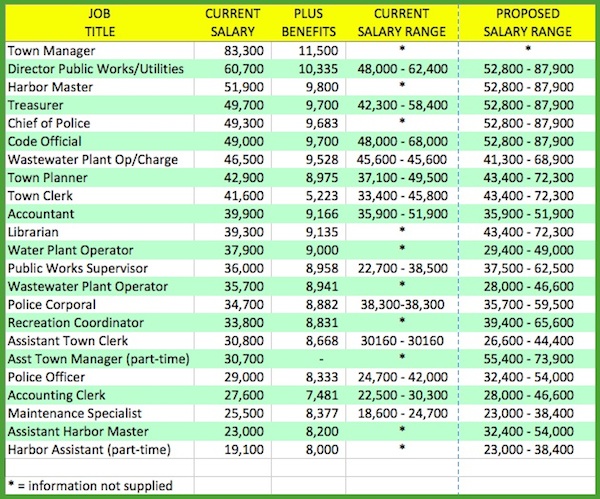Consultant Declares Town Staff Underpaid, Overworked
 CAPE CHARLES WAVE
CAPE CHARLES WAVE
September 8, 2014
A consultant hired by the Town of Cape Charles has reported that town staff salary ranges are “significantly lower” than in comparable regional organizations. The consultant warned that because salaries are “below average market rates,” Cape Charles may experience difficulty hiring and retaining employees in the future. [Read more…]
GUEST EDITORIAL: No Town Halls, No Dialogue
 By JOHN ORDEMAN
By JOHN ORDEMAN
Citizens for a Better Eastern Shore
September 8, 2014
The ShoreLine editorial board announced several months ago that we have begun a campaign to get county Supervisors to hold occasional Town Hall meetings with their constituents, a practice that would give the people who elected them an opportunity to engage in meaningful discussion with their representatives and enable the Supervisors to be more responsive to the will of the electorate.
All of the Northampton Supervisors responded to a query from ShoreLine asking whether they would schedule meetings with their constituents.
Granville Hogg, who has been holding Town Hall meetings ever since he joined the Board of Supervisors in January, wrote: “I have always thought Ron Wolff [the Accomack Supervisor who holds monthly public meetings] did a great job by meeting with his constituents. I decided it would be good for me to adopt a similar policy so long as residents were interested in what was happening. I would try to keep them informed and listen to what they thought was important. At those meetings I would exchange information with constituents. If there was disagreement, why did they disagree and what information were they relying on? In some cases, they had better information than I possessed; hence, I took that information into consideration for future decisions.”
Hogg’s statement is an excellent summary of what can be accomplished at Town Hall meetings, and it is remarkable that Hogg’s colleagues will not follow his example and give their constituents the opportunity to exchange information and debate issues with them.
Larry LeMond’s response to the query was, “I thought about holding a town hall meeting last year, but never got around to it. But I do think it is a good idea and I plan to hold one or two this year – probably the first one will be in July or August.”
Rick Hubbard wrote, “I will give your idea some consideration and look into possibly doing it sometime.”
Larry Trala sent word through Janice Williams that “he has no problem or objection to having constituent meetings.”
Oliver Bennett replied, “No comment.”
None of the Supervisors, other than Hogg, has held a Town Hall meeting in spite of the fact that Northampton County is embroiled in the most contentious issue — the proposed overhaul of zoning regulations — that residents have had to deal with in recent memory. [Read more…]
WAYNE CREED: Question Authority on Climate Change
 By WAYNE CREED
By WAYNE CREED
September 8, 2014
According to the National Climate Assessment released last month, the risk to the overall economy from coastal climate impacts (sea level rise) is substantial because coastal counties account for almost 50 percent of gross domestic product (also the most densely populated). The value of insurable properties in coastal counties tops $14 trillion.
The latest Bloomberg report, “Risky Business: The Economic Risks of Climate Change in the United States,” leans towards the CO2 problem model, noting that if current emissions stay the same, by 2050 between $66 billion and $106 billion worth of existing coastal property will likely be below sea level nationwide, growing to $238 to $507 billion by 2100. That is, by the year 2100, at least $701 billion worth of existing coastal property will be below sea level. This model has sent Wall Street into a tizzy, with Hank Paulson, Michael Bloomberg, Tom Steyer, Robert Rubin, George Shultz, and other business leaders clamoring for political action. The important name in the bunch is Tom Steyer, one of Gov. Terry McAuliffe’s biggest backers. Interestingly, as was reported in the Wave, McAuliffe has just reinstituted the Climate Change and Resiliency Commission to “attack” this problem, and the Eastern Shorekeeper is also involved.
So, what exactly is sea level rise, and when and how did it start? The term is actually Mean Sea Level (my dad used to work as party chief for the U.S. Coast and Geodetic Survey (now U.S. National Geodetic Survey), and he would travel from Bangor, Maine, to Corpus Christi, Texas, and then back again, collecting coastal elevation data used in monitoring MSL along coastal areas). The height of Mean Sea Level is given relative to a certain, arbitrarily chosen reference or datum level (such as tidal datum, or North American Datum 1927). It may rise or fall, relative to the zero point of the reference scale. The Dutch, being so vulnerable to the sea, were one of the first to start tracking MSL, and established the Dutch Ordnance Datum (NAP) in 1683. The big problem is that the zero point reference is meant to be stable over time, but tide gauges and bench marks may move vertically as a result of movements of the earth’s crust. Complicating the problem is that regional Mean Sea Level may differ from one area to the next, and regional sea level graphs cannot simply be extrapolated to show global mean sea level over time. [Read more…]
COMMENTARY: Remembering the ‘Greatest Generation’
 By ANDY ZAHN
By ANDY ZAHN
September 8, 2014
I was 10 when Pearl Harbor was bombed. All of our lives changed on that December 7th day, 1941. We had air raid drills at school where we went to the basement and stood with our heads in our arms against the wall lockers. My father taught all the town’s teachers first aid in case we actually had a raid and needed help. Air raid sirens could go off at any time, and if at night all lights had to be made not visible. Gasoline was rationed and you had to display a letter in the rear window of the car or truck with an “A” letting you buy three gallons per week if you had the money and the ration coupons. The speed limit was 35 mph to save gasoline. The top half of the headlights had to be covered with black electrical tape.
Dad trained the soldiers from Fort Monmouth how to be firefighters, and their fire engine came to our drill tower weekly for instruction. After getting the town ready for war, equipping and training the Civil Defense firefighters and working with the Red Cross, Dad tried to go back into the Army but was too old. He then joined the Navy! When the local judge heard what Dad had done we met him on Sunday outside church and he remarked that he would never do such a thing.
Now Mom and I were alone, and at age 12 I was the man of the house. Mom went to the ration board and picked up two books of coupons, one for each of us. When she got home and opened the books all the meat coupons had been stolen by a worker at the board. For the next six months we were not able to legally buy any meat.
While there were a lot of patriotic people, there were also a lot of low-lifes. Many young men joined the military and many others waited for the draft. But there were many who we called “draft dodgers” and “slackers.” There were all manner of ways to avoid the draft. Some men with one child hastened to have another baby, figuring men with two or more kids would not be drafted. Some bachelors quickly married a woman with children. Some moved to Lakewood, NJ, and took up raising poutry. Some put blotters inside their shoes to give a false pulse reading. And there was the black market where things were sold at high prices without ration coupons. [Read more…]



















